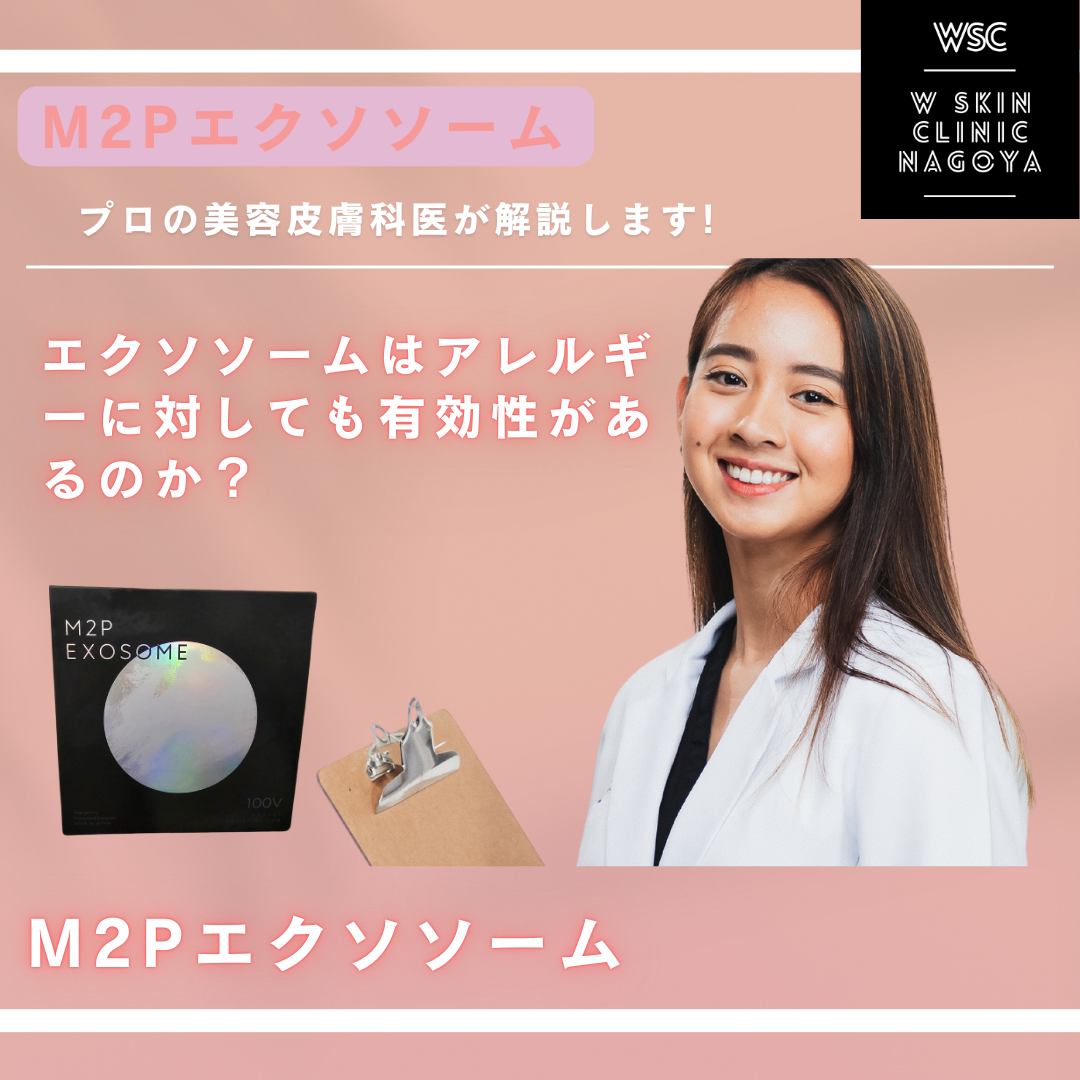NEWSお知らせ
2025.02.09|ブログ
エクソソーム点滴(M2Pエクソソーム)はアレルギーに対して効果を発揮する可能性あるか?その根拠は?名古屋の美容皮膚科医が解説

エクソソーム点滴(M2Pエクソソーム)はアレルギーに対して効果を発揮する可能性あるか?その根拠は?名古屋の美容皮膚科医が解説
こんにちは、Wスキンクリニック名古屋、院長の加藤晃司です。
今回は、エクソソーム点滴(M2Pエクソソーム)はアレルギーに対して効果を発揮する可能性あるか?その根拠は?について解説します。
エクソソーム点滴がアレルギー症状に対して効果を発揮する可能性はありますが、現時点では研究の初期段階であり、確立された治療法としては採用されていません。エクソソームが持つ抗炎症作用や免疫調節作用がアレルギー疾患に対して有効である可能性が示唆されています。以下にその理由や根拠を詳しく説明します。
- エクソソームの特徴とアレルギーへの作用機序
(1)抗炎症作用
アレルギーのメカニズム:
アレルギーは、免疫系の過剰な反応によって引き起こされる慢性炎症状態です。
具体的には、肥満細胞、好酸球、炎症性サイトカイン(IL-4、IL-5、IL-13など)の関与が指摘されています。
エクソソームの働き:
エクソソームに含まれる抗炎症因子(TGF-β、IL-10など)は、これらの炎症性メディエーターの産生を抑制し、炎症反応を抑える可能性があります。
これにより、アレルギー性炎症(例:アトピー性皮膚炎、喘息、アレルギー性鼻炎など)が軽減されると考えられます。
(2)免疫調節作用
アレルギーにおける免疫の乱れ:
アレルギーは、Th2細胞(ヘルパーT細胞)優位の免疫応答が主な原因とされています。
正常な免疫バランス(Th1/Th2バランス)が崩れることで、アレルギー反応が促進されます。
エクソソームの働き:
エクソソームに含まれる特定のマイクロRNA(miRNA)は、Th1/Th2バランスを調整し、過剰なTh2応答を抑制する可能性があります。
樹状細胞やT細胞の活性を調整し、免疫系の過剰反応を防ぎます。
(3)組織修復作用
アレルギー疾患(例:アトピー性皮膚炎や喘息)は、炎症による組織損傷が大きな問題です。
エクソソームは、線維芽細胞や上皮細胞を活性化し、損傷した組織の修復を促進する可能性があります。
- アレルギー疾患別のエクソソームの可能性
(1)アトピー性皮膚炎
研究状況:
エクソソームが皮膚のバリア機能を強化し、炎症性サイトカインを抑制する効果が示唆されています。
期待される効果:
痒みや赤みの軽減。
肌の修復を助け、症状の再発を予防。
(2)喘息
研究状況:
動物モデルでは、エクソソームが気道炎症を抑え、気道過敏性を軽減する結果が報告されています。
気道のリモデリング(組織の変性)を防ぐ可能性も示されています。
期待される効果:
呼吸困難や気道炎症の軽減。
発作の頻度や重症度の低下。
(3)アレルギー性鼻炎
研究状況:
鼻粘膜の炎症性サイトカイン産生を抑制することで、鼻詰まりやくしゃみ、鼻水を軽減する可能性が示されています。
期待される効果:
鼻粘膜の炎症緩和。
アレルギー反応の閾値を引き上げることで、症状が軽減。
- 根拠となる研究データ
(1)動物実験
動物モデル(アレルギー性喘息やアトピー性皮膚炎モデル)では、エクソソームが炎症性細胞の浸潤を抑制し、アレルギー症状を軽減したという報告があります。
エクソソームに含まれる特定のmiRNAが、炎症の抑制と免疫バランスの調整に寄与したとされています。
(2)基礎研究
幹細胞由来のエクソソーム(特に間葉系幹細胞由来)が、抗炎症作用や組織修復において有望な結果を示している。
(3)臨床試験
アレルギー疾患におけるエクソソームの臨床試験はまだ初期段階ですが、アトピー性皮膚炎患者を対象にした試験では、症状の軽減や生活の質(QOL)の向上が報告されています。
まとめ
エクソソーム点滴は、アレルギーに対して抗炎症作用や免疫調節作用を通じて効果を発揮する可能性があると考えられます。特に、アトピー性皮膚炎や喘息、アレルギー性鼻炎などの症状軽減に期待されています。
私もエクソソーム点鼻を使っていますが、鼻炎はかなり改善しました。
当院ではセルソース社の開発したM2Pエクソソームを使用しています。
細胞を修復、再生する機能があるため、あらゆる症状を改善する可能性があります。
現在モニターを募集しておりますので、ご興味のある方はクリニックまでお問合せください。
<当院で施術可能な、再生医療×精神科治療>
TMS治療はこちら
https://www.w-clinic-nagoya.com/tms
Wスキンクリニック名古屋でのエクソソーム治療はこちら
https://www.w-clinic-nagoya.com/acne/exosome
NMN点滴はこちら
https://www.w-clinic-nagoya.com/beauty-drip/nmn
高濃度ビタミンC点滴はこちら
https://www.w-clinic-nagoya.com/beauty-drip/vitamin-c
*当院では
NMNは一般社団法人NMN医療研究会、エクソソームはセルソース株式会社のM2P-エクソソームを使用しています。
当院では無料でスタッフカウンセリングを行なっております。
お気軽にご予約くださいませ
Wスキンクリニック名古屋 (美容皮膚科)
https://www.w-clinic-nagoya.com/
〒461-0005 愛知県名古屋市東区東桜 2-4-1 第3コジマビル6F
TEL 052-7377-7117(10:00~19:00)
LINE ID @w.nagoya
高岳駅より徒歩4分 / 新栄町駅より徒歩5分
お車でお越しの方
名鉄協商パーキングチケットをお渡しいたしますので、クリニック近くのパーキングをご利用ください。
ご予約、お問合せ、Wスキンクリニック名古屋公式LINEからも可能です。
LINE ID : @w.nagoya
友達追加は↓から
Wスキンクリニック名古屋公式インスタ↓
https://www.instagram.com/w.skinclinic.nagoya?igsh=NHhoODFnaXB2b2ll&utm_source=qr
Wスキンクリニック院長 加藤晃司インスタ↓
https://www.instagram.com/w.skin.nagoya.kojikato?igsh=aW9nbWZwNjNjZ3pz&utm_source=qr
Can Exosome IV Therapy Help with Allergies? A Dermatologist in Nagoya Explains
Hello, this is Dr. Koji Kato, Director of W Skin Clinic Nagoya.
Today, I will discuss whether exosome IV therapy can be effective for allergies and the scientific basis behind it.
Although exosome therapy is still in its early stages of research, it has been suggested that its anti-inflammatory and immune-regulating properties may help manage allergic conditions. Below, I will explain how exosomes may work against allergies based on current research findings.
- How Do Exosomes Affect Allergies?
(1) Anti-Inflammatory Effects
How Allergies Work:
Allergies occur due to an overactive immune response, leading to chronic inflammation.
Key immune cells involved in allergic reactions include mast cells, eosinophils, and inflammatory cytokines (such as IL-4, IL-5, and IL-13).
How Exosomes Work:
Exosomes contain anti-inflammatory molecules like TGF-β and IL-10, which can suppress the production of inflammatory mediators.
This reduces allergic inflammation, potentially benefiting conditions like atopic dermatitis, asthma, and allergic rhinitis.
(2) Immune Modulation Effects
Immune Imbalance in Allergies:
Allergic reactions are driven by an imbalance in Th1/Th2 immune responses, where Th2 dominance leads to excessive allergic inflammation.
How Exosomes Work:
Exosomes carry specific microRNAs (miRNAs) that help restore Th1/Th2 balance, reducing excessive Th2 responses.
They regulate dendritic cells and T-cell activity, preventing the overactivation of the immune system.
(3) Tissue Repair Effects
Chronic allergic conditions like atopic dermatitis and asthma often lead to tissue damage due to prolonged inflammation.
Exosomes have been shown to activate fibroblasts and epithelial cells, promoting tissue regeneration and repair.
- Potential Benefits of Exosomes for Specific Allergic Conditions
(1) Atopic Dermatitis (Eczema)
Current Research:
Studies suggest that exosomes enhance skin barrier function and suppress inflammatory cytokines involved in eczema.
Expected Benefits:
Reduction in itching and redness.
Improved skin repair and reduced flare-ups.
(2) Asthma
Current Research:
Animal studies indicate that exosomes reduce airway inflammation and hyperresponsiveness.
They may also prevent airway remodeling, which occurs in chronic asthma.
Expected Benefits:
Less airway inflammation and breathing difficulty.
Reduced frequency and severity of asthma attacks.
(3) Allergic Rhinitis (Hay Fever)
Current Research:
Exosomes may suppress inflammatory cytokine production in nasal mucosa, reducing symptoms of allergic rhinitis.
Expected Benefits:
Relief from nasal congestion, sneezing, and runny nose.
Increased tolerance to allergens over time.
- Scientific Evidence Supporting Exosome Therapy for Allergies
(1) Animal Studies
Research using allergic asthma and atopic dermatitis models has shown that exosome therapy can suppress inflammatory cell infiltration and reduce symptoms.
Specific miRNAs in exosomes have been identified as key regulators in reducing allergic inflammation.
(2) Laboratory (In Vitro) Studies
Exosomes derived from mesenchymal stem cells (MSCs) have shown strong anti-inflammatory and tissue repair properties in laboratory studies.
(3) Clinical Studies (Early Stage)
Some clinical trials on atopic dermatitis patients suggest that exosome therapy can reduce symptoms and improve quality of life (QOL).
However, large-scale human trials are still needed to confirm its effectiveness for allergies.
- Conclusion: Can Exosome Therapy Help with Allergies?
Exosome therapy has the potential to help manage allergies through its anti-inflammatory, immune-regulating, and tissue-repairing effects.
Conditions such as atopic dermatitis, asthma, and allergic rhinitis may benefit from reduced inflammation and improved immune balance.
While early research is promising, more clinical studies are needed before exosome therapy becomes a standardized allergy treatment.
- My Personal Experience & Treatment at W Skin Clinic
I have personally used exosome nasal spray, and I have noticed significant improvements in allergic rhinitis symptoms.
At W Skin Clinic Nagoya, we use M2P Exosomes developed by CellSource, a trusted provider of advanced regenerative treatments.
Because exosomes support cell repair and regeneration, they have the potential to improve a wide range of conditions.
📢 We are currently recruiting monitor patients for exosome therapy.
If you are interested, feel free to contact our clinic for more details!
💡 Early intervention in anti-aging and immune balance treatments can make a big difference in long-term health. Let's fight allergies and inflammation together!




